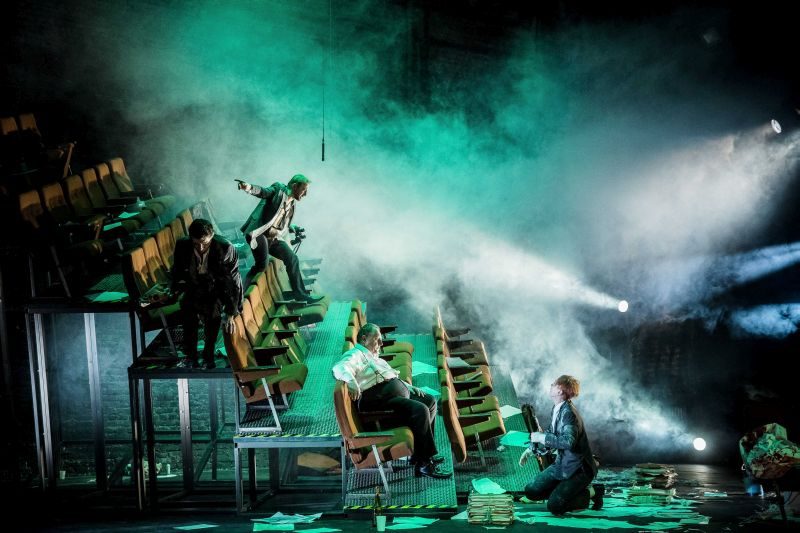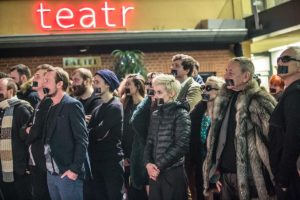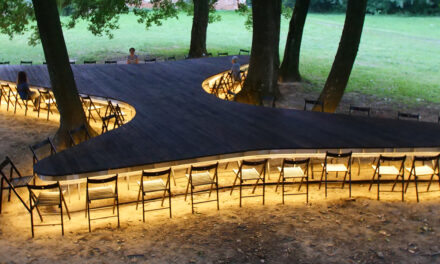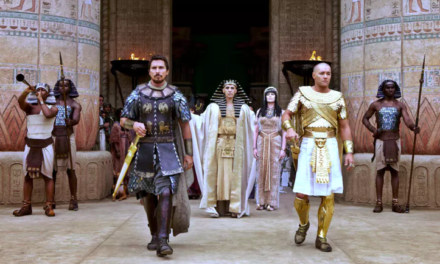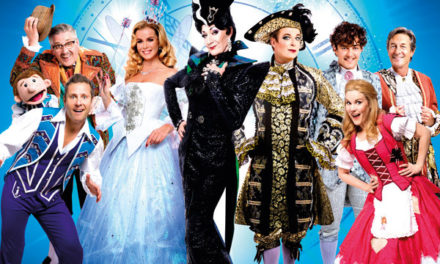The year 2016 was marked by theatre artists resisting narratives imposed by the Polish government and a very unstable political situation in Poland. I started the first part of this article by referring to Triumf Woli [The Triumph of the Will] by the directorial and dramaturgical duet Monika Strzępka and Paweł Demirski as a metaphor of 2016 in Polish theatre. I will start the second by part by referring to Strzępka and Demirski’s work again. Their TV drama The Artists premiered in autumn 2016 and told a story of a fictional theatre in Warsaw dealing with authorities trying to destroy it. The theatre circles, in particular, saw a striking relevance to the current situation in Polish theatre… The actors in Polish theatre have never submitted to traditional relationships of power in the theatre that tend to present the actor as an interpretative artist, submissive to the director and producer. However, 2016 took it to the next level and saw Polish actors taking leading roles on socio-political stages.
RIFTS AND REVOLUTIONS
When describing a regular theatrical year in Poland, one would not have much to say about summer months. A theatrical season in Poland starts in September and ends in June. In 2016, however, events of August threw a shadow on the rest of the year. It all started with Cezary Morawski being appointed as the new director of the Polski Theatre in Wrocław. Some members of the appointment panel, including Krystian Lupa, protested against the process and called it fraud; the public prosecutor office was informed. Following that, Lupa broke off rehearsals for Franz Kafka’s The Trial. The overwhelming majority of the theatre ensemble also protested against Morawski. The actors and most of the theatre circles in Poland pointed out that Cezary Morawski lacks any experience to lead one of the strongest and largest theatres in Poland. However, Morawski, with the support of the government and local authorities, took on the position. Henceforth, the Polski Theatre and Wrocław, the 2016 European Capital of Culture, became a battlefield. The actors continued to protest using public media and theatre and getting the support of the Wrocław theatre-goers. The actors with their mouth taped became an ever-present element of curtain calls at the Polski Theatre in Wrocław. This was the case when the ensemble was playing in Wrocław, at the international festivals in Korea and Japan, and during the Paris Autumn. In the meantime, Morawski continued to remove shows that challenged the right-wing government rhetoric from the theatre repertoire, refusing entry to those spectators that joined the protests, and, finally, dismissing members of the ensemble. Other Polish ensembles have been supporting Wrocław with actors all over Poland coming out to their curtain calls with their mouth taped.
This is not the first incident of a theatre ensemble in Poland protesting their director. At the end of 2015, the Studio Theatre in Warsaw went through a period of conflict between the general director and artistic director supported by the ensemble. At the end, however, a form of compromise was reached. It does not look like this is a possibility in Wrocław. So far the Polski Theatre has failed to deliver even one premiere this season, which is unprecedented in its history. At the same time, the ensemble-led Polski Theatre Underground premiered Tak zwana ludzkość w obłędzie [So-Called Humanity is Sinking Into Madness] directed by Krzysztof Garbaczewski and presented on a different stage in Wrocław. The Wrocław conflict seems to question and redefine the ownership and the leadership of theatre in Poland, perhaps this is why its scale is so large and stakes so high. It also seems strangely fitting that the actor-led protest started in a year that saw other Polish actors taking leading roles in black marches and other anti-government protests.
With all this in mind, it is interesting to recall actor-director Barbara Wysocka’s staging of Shakespeare’s Julius Caesar that premiered in January 2016 at the Powszechny Theatre in Warsaw. The production created very strong links between the play and Polish politics while predicting and warning against a civil war in Poland. The national conflict was also a focus of Hymn narodowy [National Anthem] written and directed by Przemysław Wojcieszek for the Modjeska Theatre in Legnica. Hymn narodowy ridiculed Polish politics and politicians by portraying them as demons fighting for the soul of a Polish worker.
CHALLENGING XENOPHOBIA
In the context of the Polish government’s refusal to accept any refugees, it was good to see that so many productions tackled xenophobia and racism. The Stary Theatre in Cracow presented Podopieczni [The Supplicants] based on Elfriede Jelinek’s Die Schutzflehenden, adapted by Joanna Bednarczyk and directed by Paweł Miśkiewicz. The production explored fear of refugees and what this fear says about our society. In the Powszechny Theatre in Warsaw, director Maja Kleczewska and dramaturg Łukasz Chotkowski took on another Jelinek’s play Wściekłość [The Rage] and interrogated Polish xenophobia and European and Christian sense of moral superiority. The refugee crisis also reached the theatre for young audiences. In the Wrocław Puppetry Theatre, Martyna Majewska used multimedia to present Yemaya – Królowa Mórz [Yemaya – the Sea Queen]: a story of refugees seen through the eyes of a five-year-old boy who has to run away from his home and across a large sea to escape a war.
!["Yemaya - Królowa Mórz" [Yemaya – the Sea Queen], directed by Martyna Majewska, Left to right: Marta Kwiek (Yemaya) and Agata Kucińska (Omar), Photo by Wrocławski Teatr Lalek](https://thetheatretimes.com/wp-content/uploads/2017/01/Yemaya9-300x200.jpg)
Yemaya – Królowa Mórz [Yemaya – the Sea Queen], directed by Martyna Majewska, Left to right: Marta Kwiek (Yemaya) and Agata Kucińska (Omar), Photo by Wrocławski Teatr Lalek
LOOKING FORWARD TO 2017
2017 also promises more exciting stagings of Polish classics (including two stagings of Wyspiański’s Liberation), a new production by Grzegorz Jarzyna, and at least three new plays on heroes of the fight against communism like Jacek Kuroń, Lech Wałęsa or entire Solidarność [Solidarity] movement (in Warsaw, Cracow and Bydgoszcz). Directors will also tackle issues that have been raising a lot of controversy in Polish society. Martyna Łyko already presented her staging of Dziecko [A Child] at the Współczesny Theatre in Szczecin. This playwriting debut of Inga Iwasiów, an award-winning Polish novelist, looks at IVF and the government interference with one’s right to have a child. February will see a premiere of Raj. Tutorial [Paradise. Tutorial] at the Wałbrzych Theatre. Director Jędrzej Piaskowski and two dramaturgs will look at intersexuality. In April, Małgorzata Wdowik in Dziewczynki [Girls] by Weronika Murek will look at a female body and social constructs around it. And, if one is looking for pure escapism and entertainment, there is always Wiedźmin [The Witcher] at the Danuta Baduszkowa Music Theatre in Gdynia. This is a musical based on an iconic Polish fantasy series by Andrzej Sapkowski known outside of Poland through The Witcher video game. Considering that the production’s director is Wojciech Kościelniak – who in 2014 received the Teatr magazine award for revolutionizing Polish musical theatre – it may be an event not to be missed. The premiere is planned for September.
This post was written by the author in their personal capacity.The opinions expressed in this article are the author’s own and do not reflect the view of The Theatre Times, their staff or collaborators.
This post was written by Kasia Lech.
The views expressed here belong to the author and do not necessarily reflect our views and opinions.

